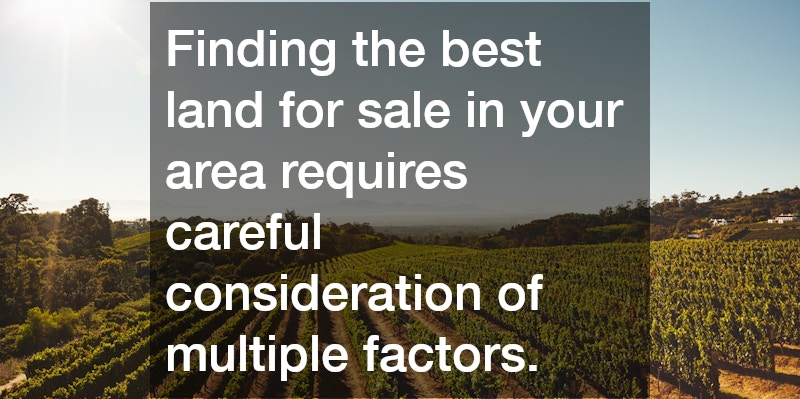
Searching for land for sale involves a combination of strategic planning and thorough research. Understanding the key factors that influence land buying decisions helps you make an informed and confident choice.
From location to legal regulations, each aspect plays a crucial role in determining the suitability of a parcel of land. Delving into these considerations will equip you with the knowledge to navigate the market effectively.
In this article, we will explore essential strategies and considerations for finding the perfect land parcel in your area.
What Factors Should I Consider When Buying Land?
Location and Accessibility
The importance of location cannot be overstated when buying land. A location’s proximity to amenities, infrastructure, and natural resources can greatly affect the land’s value and future potential.
Accessibility is another critical factor to evaluate, as it impacts ease of transportation and connectivity. Evaluate existing road networks, public transit options, and future development plans in the area.
Moreover, consider the neighborhood’s growth prospects and potential for appreciation over time. Factors such as nearby developments and economic activity can significantly influence these.
Legal and Zoning Considerations
Navigating legal aspects is essential to ensuring the success of your land purchase. This includes being aware of zoning laws, environmental regulations, and any restrictions that may apply to the land.
Zoning laws dictate how land can be used, which affects whether the property can be used for residential, commercial, agricultural, or mixed purposes. It’s vital to check with local authorities for any zoning changes or restrictions.
Understanding any easements or rights of way that could affect your usage of the land is crucial. Consult with a legal expert to ensure all legalities are thoroughly vetted and understood.
How Do I Research the Market for Land?
Utilizing Online Resources
Online platforms and real estate websites are invaluable for conducting preliminary market research. These tools provide up-to-date listings and detailed information about land parcels in your area.
By filtering search results based on location, price, and size, you can narrow down options that best suit your requirements. Many websites also offer market trend insights, which can be pivotal in decisions.
Another advantage of online resources is the ease of comparing various listings. This allows you to better gauge market prices and identify potential bargains or overpriced properties.
Networking with Local Real Estate Experts
Building relationships with local real estate agents can provide valuable insights into the land market. Agents often have access to exclusive listings and industry knowledge that might not be available online.
Engaging with professionals allows for tailored advice based on your specific requirements and budget. Their expertise can also help you understand local market dynamics and identify emerging opportunities.
Moreover, real estate experts can guide you through complexities such as zoning laws and legal requirements. Networking with these professionals is a strategic move to enhance your land-buying process.
What are the Steps to Finalize a Land Purchase?
Securing Financing and Budgeting
Begin by assessing your financial situation to determine how much you can afford to invest in land. Then, consider approaching financial institutions to explore mortgage or loan options tailored to land purchases.
Creating a comprehensive budget helps in managing costs effectively, including additional expenses like taxes and utility connections. Planning your finances is crucial to avoid unexpected setbacks in your purchasing process.
Consult with financial advisors to explore various funding options and select the plan that aligns best with your financial goals. Proper budgeting is the cornerstone of a successful land purchase.
Closing the Deal
Once financing is secured, it’s time to proceed with the closing process. This involves conducting due diligence, such as obtaining a land survey and title search, to ensure clarity and transparency.
Engaging with legal professionals can help you understand contracts and negotiations and ensure that all parties adhere to the agreed terms. The closing meeting typically involves signing necessary documents and transferring ownership.
Successfully closing the deal requires attention to detail and adherence to legal protocols. Thorough preparation and professional guidance will ensure a seamless transaction.
In conclusion, finding the best land for sale in your area requires careful consideration of multiple factors. Understanding the nuances of location, legal regulations, and market dynamics is key to making an informed decision.
Utilizing both online and offline resources can significantly aid in your search and negotiation process. With thoughtful planning and expert guidance, purchasing land can be a rewarding investment.
By following the strategies outlined in this article, you’re well-equipped to embark on your journey to acquiring the perfect plot of land. Your dream property awaits, and the right approach will lead you straight to it.




